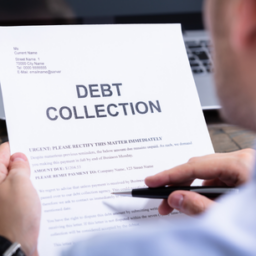There is a high number of complaints involving debt scammers every day. It is safe to assume that these scammers continue their efforts because they are getting money from unsuspecting people. It is important for you to learn how to identify debt collectors from scammers and avoid being a victim of a debt collection scam.
Debt scammers usually contact you by phone, text message, mail, or email claiming that you owe them a specific amount of debt and requesting immediate payment. However, said debt is forgiven, discharged, canceled, or even nonexistent. For debt scammers, the process is very common and simple.
How to Recognize a Debt Scammer?
A debt collector is a third party engaged in attempting to collect a debt owed to a different party such as debt collection agencies, collection attorneys, or debt buyers. In contrast, a creditor is a party or entity that extended you the credit in the first place. For example, your credit card company. According to the Fair Debt Collection Practices Act (“FDCPA”), https://www.ftc.gov/legal-library/browse/rules/fair-debt-collection-practices-act-text, debt collectors are required to identify themselves by law and to give you information about your debt, who was the original creditor, and how you can dispute said debt.
In practice, debt scammers will try to avoid identifying themselves and answering basic questions such as who they are and the amount that you owed. As a debtor, you need to be prepared to ask questions.
The following list may help you to find out if you are dealing with a legitimate debt collector or a scammer:
• The debt collector does not identify themselves,
• The debt collector uses deceptive language,
• The debt collector threatens you,
• The debt collector request immediate payment, and
• You do not recognize the debt.
If you notice any of the above scenarios during any conversation with someone who claims to be a debt collector, it should be a red flag for you because you may be the target of a potential scam. Mathew Higbee, who represents clients who are dealing with financial challenges, points out that “debtors cannot be afraid of asking debt collectors to identify themselves”. In fact, he said that “it is important to ask questions to know whom you are dealing with because as a consumer you have rights, and you have to protect yourself”.
How Can a Debtor Protect Themselves?
The best way to protect yourself from debt scammers is always to request a debt validation, also known as a validation notice. According to Section 809 of the FDCPA https://www.ftc.gov/legal-library/browse/rules/fair-debt-collection-practices-act-text – 809, the debt collector is required to give you specific information about your debt during the first initial form of communication, or in writing (by mail or electronically) within five days of that original contact.
In general, in the debt validation notice, debt collectors must specify the following:
• The amount of debt owed, interests, fees, and payments, • The name of the original creditor to whom you owed the debt,
• The account’s information associated with that debt,
• Information about how you can dispute the debt, and if you do not dispute the debt within 30 days the debt is assumed to be valid, and
• A statement that if the debtor disputes the debt or part of the debt within the 30-day period, the debt collector will inform the debtor about the name and address of the original creditor.
You can obtain more information here https://www.consumerfinance.gov/rules-policy/regulations/1006/34/
If you feel that you could be a victim of a debt scammer, feel free to contact us. Our legal team of experienced attorneys will be glad to help you.





